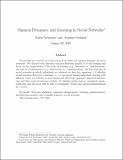Opinion Dynamics and Learning in Social Networks
Author(s)
Acemoglu, Daron; Ozdaglar, Asuman E.
DownloadAcemoglu_Opinion dynamics.pdf (364.1Kb)
OPEN_ACCESS_POLICY
Open Access Policy
Creative Commons Attribution-Noncommercial-Share Alike
Terms of use
Metadata
Show full item recordAbstract
We provide an overview of recent research on belief and opinion dynamics in social
networks. We discuss both Bayesian and non-Bayesian models of social learning and
focus on the implications of the form of learning (e.g., Bayesian vs. non-Bayesian),
the sources of information (e.g., observation vs. communication), and the structure of
social networks in which individuals are situated on three key questions: (1) whether
social learning will lead to consensus, i.e., to agreement among individuals starting with
diff erent views; (2) whether social learning will effectively aggregate dispersed information
and thus weed out incorrect beliefs; (3) whether media sources, prominent agents,
politicians and the state will be able to manipulate beliefs and spread misinformation
in a society.
Date issued
2010-08Department
Massachusetts Institute of Technology. Department of Economics; Massachusetts Institute of Technology. Department of Electrical Engineering and Computer Science; Massachusetts Institute of Technology. Laboratory for Information and Decision SystemsJournal
Dynamic Games and Applications
Publisher
Springer-Verlag
Citation
Acemoglu, Daron and Asuman Ozdaglar. "Opinion Dynamics and Learning in Social Networks." Dynamic Games and Applications, 1.1 (March 2011) : p.3-49.
Version: Author's final manuscript
ISSN
2153-0785
2153-0793